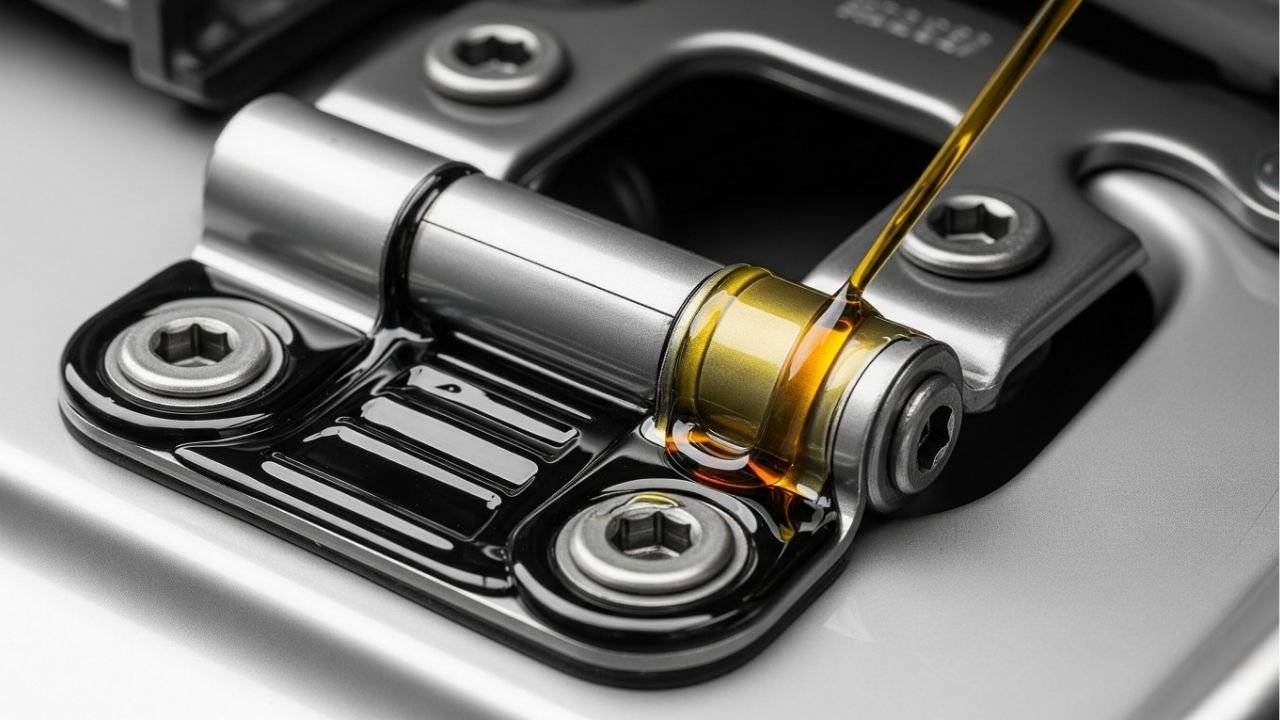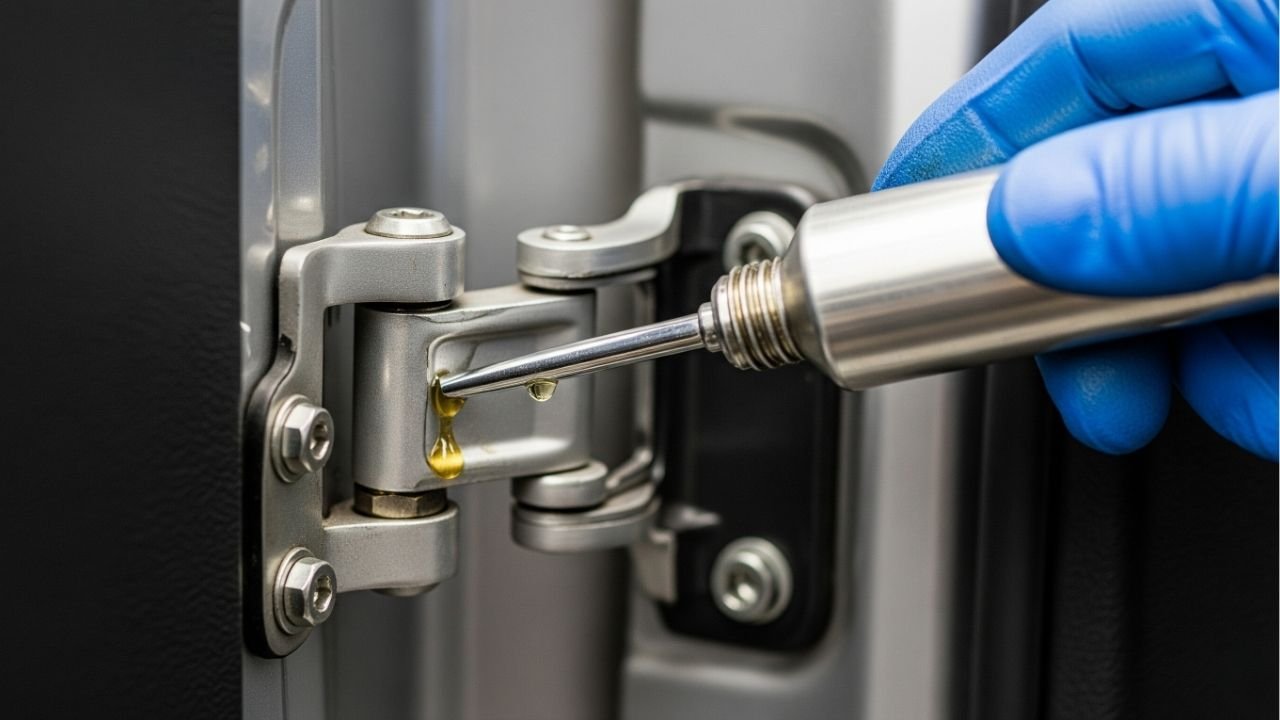The Best Oil for Car Door Hinges: Stop the Squeak, Save the Day

Have you ever pulled open your car door and heard that loud, cringy squeak echo through the neighborhood? Yep, it’s not just annoying — it’s a cry for help from your car. I’ve been there too. One rainy morning, I opened my old Corolla’s door and scree-eech — I swear, even the birds looked offended. That’s when I realized how important the right oil for car door hinges really is.
Car hinges may seem like small, innocent parts of your vehicle, but they work hard every day. And without proper care, they wear out, get rusty, or even worse — break. That’s why in this guide, I’ll walk you through the best oil for car door hinges, what works, what doesn’t, and how a simple habit can keep your car feeling fresh and quiet for years.
Let’s dive in — your car doors are waiting.
Why Your Car Door Hinges Squeak (And Why You Should Care)
Car doors swing open and closed dozens of times a day. Over time, dust, dirt, moisture, and wear can build up on the hinges, making them dry and squeaky. Think of it like your knees after sitting for hours — they need lubrication too.
Here’s what causes that annoying squeak:
Rust and corrosion from rain and humidity
Lack of lubrication or use of the wrong lubricant
Grime and buildup of road dust or salt
Wear and tear from age or frequent use
And here’s why it matters:
Reduced lifespan of the hinges
Poor door alignment or jamming
Costly repairs down the road
Daily frustration (and possible embarrassment!)
Your car is more than just a machine. It’s part of your daily life. When something as simple as a door hinge makes noise, it affects your comfort — and your wallet. So let’s find out what you can do about it.
What Makes a Good Oil for Car Door Hinges?

Here’s what to look for in the best oil for car door hinges:
| Feature | Why It Matters |
|---|---|
| Thin and penetrating | So it can seep deep into tight hinge spaces |
| Rust protection | To keep moisture out and prevent corrosion |
| Non-sticky | Avoids attracting dirt and gunk over time |
| Long-lasting | So you’re not reapplying it every other week |
| Temperature resistant | Works in both hot summers and cold winters |
Some of the best products are actually synthetic sprays, silicone-based lubes, or white lithium grease, depending on your needs. But don’t worry — I’ll break it down for you next.
Top 5 Best Oils for Car Door Hinges (Tried, Tested & Trusted)
Let’s look at some real-world winners — these are products I or people I know have used and swear by. If your car’s hinges are squeaking or stiff, these will save the day.
1. WD-40 Specialist Water Resistant Silicone Lubricant
“Great for regular use, and it’s safe on rubber, plastic, and metal.”
WD-40 is a household name, but the Specialist Silicone Lubricant is even better for hinges. It doesn’t just clean; it lubricates and protects. This formula doesn’t attract dirt and works like magic in rain or snow.
Penetrates quickly
Doesn’t wash off easily
Leaves a protective film
No messy residue
It’s honestly my go-to for everyday maintenance. Spray it directly on the hinge, swing the door open and closed a few times, and done.
2. 3-IN-ONE Multi-Purpose Oil
“Small bottle, big impact.”
If you want something traditional and easy to apply, 3-IN-ONE oil is perfect. It’s been around for over 100 years for a reason. It’s light, penetrates deep, and works fast.
Budget-friendly
Precision applicator tip
Long shelf life
Good for light-duty hinges
I keep a bottle in my glovebox — it’s like pocket-sized peace of mind.
3. White Lithium Grease Spray (e.g., CRC or Permatex)
“Great for long-term protection, especially in tough weather.”
White lithium grease is heavier than silicone, but it’s ideal for older or louder hinges. Once it dries, it forms a strong layer that resists moisture and wear.
Excellent for metal-on-metal contact
Ideal for extreme temperatures
Lasts longer between applications
Be careful, though. It can get messy if overapplied. Use it when your hinges need serious TLC.
4. Blaster Silicone Lubricant
“Smooth as butter, even in extreme cold.”
If you live somewhere where winter hits hard, this stuff’s a life-saver. Blaster Silicone Lubricant has high weather resistance and can handle cold, salt, and moisture.
Non-drying
Prevents freezing
Safe on painted surfaces
Doesn’t stink like some lubricants
A neighbor of mine used this during a Canadian winter, and it worked flawlessly. His doors opened smoother than a hot knife through butter.
5. Tri-Flow Superior Lubricant
“The technician’s choice.”
Tri-Flow is a professional-grade lubricant designed to get into the smallest crevices. It has Teflon additives that reduce friction dramatically.
Ultra-low viscosity
Ideal for hinges, locks, and small parts
Comes with a thin straw for precision
Protects against rust
This one is often used by bike mechanics and locksmiths, but it works wonders on car door hinges too.
How to Apply Oil to Car Door Hinges Like a Pro
Let me walk you through the process. It’s super simple, takes 5–10 minutes, and you don’t need any fancy tools. But doing it right makes a big difference.
Here’s what you’ll need:
Your chosen best oil for car door hinges
A clean rag or towel
Optional: toothbrush or small brush
Optional: gloves (if using grease)
Steps:
Open the car door fully.
You want full access to the hinge from every angle.Wipe away dirt.
Use your rag to clean off old grease, rust flakes, or dirt. If it’s really gunked up, use a toothbrush.Apply the oil or spray.
Aim directly at the pivot points. Use the straw for precision if available.Move the door back and forth.
This helps the oil spread evenly into the hinge.Wipe off excess.
You don’t want oil dripping down your door frame.Repeat every 3–6 months or as needed — especially in rainy or snowy seasons.
Common Mistakes to Avoid When Oiling Hinges
Sometimes, doing the right thing the wrong way causes more harm than good. Let’s make sure that doesn’t happen.
Using engine oil or cooking oil
These attract dust and go rancid — trust me, the smell is horrible.Over-oiling
More isn’t always better. Excess oil can drip and attract grime.Forgetting the latch or striker
These also benefit from a quick spray.Not wiping off rust first
Oiling over rust just seals in the problem.
Treat oiling your hinges like brushing your teeth. Quick, simple, and if you do it right, it saves you from future headaches.
How Weather Impacts Car Door Hinges and Oil Choice
Weather plays a huge role in how your car door hinges behave. Think of it like this: just like our joints feel stiffer in the cold or more swollen in heat, car hinges react to temperature, moisture, and humidity.
In Cold Climates:
Hinges may freeze or stiffen due to ice buildup.
Moisture can condense inside the hinges, making rust form faster.
A silicone-based lubricant is best. It resists freezing and water.
In Hot, Dusty Areas:
Thin oils evaporate faster and can attract dust.
Grease can melt slightly and become messy.
Opt for a white lithium spray that stays in place and handles heat.
In Rainy or Humid Conditions:
Hinges are at risk of rusting due to consistent moisture.
Avoid oils that wash away easily.
Choose a water-resistant lubricant like WD-40 Specialist Silicone.
Pro Tip:
Apply your oil before the seasons change — like spring and fall. That way, you prevent issues before they start.
DIY vs. Professional Help: Do You Really Need a Mechanic?
Honestly? You don’t need a mechanic for squeaky car door hinges. It’s a basic maintenance task anyone can do at home. But — if the door doesn’t align, won’t open properly, or makes a metal-on-metal grinding sound, then yes, it’s time to visit a pro.
Here’s a quick breakdown:
| Scenario | DIY or Mechanic? |
|---|---|
| Squeaking noise only | DIY |
| Visible rust but hinge moves | DIY (scrape + oil) |
| Door hard to open or slams | Mechanic |
| Hinge looks bent or broken | Mechanic |
| You’ve never done it before | DIY (very simple!) |
Sometimes, even just standing outside on a weekend, cup of tea in hand, and doing this yourself gives you that satisfying “I took care of it” feeling. And your car? It’ll feel the love.
Bullet List: What to Avoid When Buying Oil for Hinges
Don’t make these common mistakes:
Buying thick grease jars that don’t spray — hard to apply
Choosing oils without rust protection
Using multi-purpose household oils not designed for auto use
Ignoring user reviews — always check feedback
Falling for cheap knock-offs online that drip or damage paint
Stick with trusted brands, always check for automotive use, and never buy an oil that doesn’t say it’s safe for metal-to-metal contact.
How Often Should You Oil Car Door Hinges?
Let’s keep it real. You don’t need to oil your car door hinges every week. But don’t wait for the squeak either.
Here’s a general timeline:
Every 4 to 6 months for most vehicles
Every 3 months in harsh climates (extreme cold or humidity)
Before and after winter for rust prevention
Whenever you hear a squeak
Think of it as part of your car’s wellness check. Like changing wiper blades or checking tire pressure — simple, effective, and absolutely worth it.
FAQs About the Best Oil for Car Door Hinges
1. Can I use WD-40 on car door hinges?
Yes, but choose WD-40 Specialist Silicone Lubricant instead of the original formula. It lubricates and protects without attracting dust.
2. Is white lithium grease better than regular oil?
In some cases, yes. It lasts longer, especially on older or noisy hinges, and offers better weather resistance.
3. How do I remove rust before oiling the hinges?
Use a wire brush or an old toothbrush to gently scrub the rust away. Wipe it clean with a dry cloth before applying oil.
4. Is it okay to oil car door locks too?
Yes, but use a lock-specific lubricant like graphite or silicone spray. Avoid thick oils that may gum up the internal lock mechanism.
5. Can I use motorcycle chain lube on hinges?
Not recommended. It’s designed for high-speed metal movement and can be too sticky or messy for door hinges.
6. What happens if I don’t oil my hinges?
They can squeak, corrode, wear out faster, or cause misalignment. Eventually, you may face a broken hinge — and that’s not cheap.
7. How do I clean up excess oil after applying?
Just use a clean cloth. If it’s greasy or sticky, add a small bit of rubbing alcohol or degreaser and wipe again.
8. Should I oil the hinges on brand-new cars?
Yes! Even new cars benefit from a bit of lube every few months, especially in harsh weather. Prevention is better (and cheaper) than cure.
Real-Life Story: My First Car and a Lesson in Squeaks
Let me tell you a quick story. My first car was a 1997 Honda Civic — nothing fancy, but I loved it. After the first rainy season, I noticed the passenger door started squeaking — like, embarrassingly loud. I ignored it. Then one day, the hinge actually cracked and the door sagged. I had to get it replaced.
A $7 bottle of oil could have saved me a $300 repair.
Lesson learned. Ever since then, I oil my hinges every few months. And every time I do, I think back to that Civic and smile — because it taught me the value of simple maintenance.
Final Thoughts: Silence the Squeak, Keep the Peace
Keeping your car quiet and smooth doesn’t need a mechanic. Just the right oil for your car door hinges, a little time, and a bit of care. Whether you’re dealing with winter rust or dry summer dust, choosing the best product — like a silicone spray or white lithium grease — makes all the difference.
Here’s what to remember:
Listen to your car — squeaks are a sign
Use the right type of lubricant, not just any oil
Maintain hinges seasonally or as needed
Avoid overdoing it — a little goes a long way
Keep a small bottle in your glovebox — just in case
A car without squeaky doors feels newer, smoother, and just plain better. Treat your ride like it deserves — quiet, smooth, and strong.






